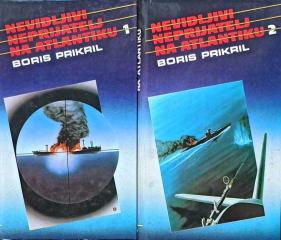Boris Prikril
Boris Prikril (Zagreb, 4. maj 1915 – Rijeka, 29. decembar 1995) je bio hrvatski inženjer elektrotehnike, saobraćajni stručnjak i jedan od najplodnijih publicista o pomorskoj istoriji i ratovanju na moru u Hrvatskoj.
Diplomirao je elektrotehniku i mašinstvo na Tehničkom fakultetu u Zagrebu 1941. godine, a doktorirao 1946. godine disertacijom Planski razvoj Jugoslavije u dve petoletke. Tokom svoje karijere obavljao je niz značajnih funkcija: rukovodio je izradom prvog petogodišnjeg plana Jugoslavije (1946–1948), bio je pomoćnik ministra narodne odbrane, a od 1948. rukovodio razvojem jugoslovenske brodogradnje. U Rijeci je bio generalni inženjer Glavne direkcije brodogradnje za industriju brodogradnje),1. planiranje i ekonomski razvoj (1957–1961), regionalni savetnik za Afriku i šef energetskog odeljenja Ekonomske komisije UN za Evropu (1961–1965), rukovodilac sektora za razvoj Luke Rijeka (1970–1974).
Kao autor, Prikril se istakao brojnim radovima o pomorskoj istoriji i ratovanju. Među njegovim najpoznatijim knjigama su Pacifički pakao (1954), Bitka za Mediteran (1956), Nevidljivi neprijatelj na Atlantiku (1958) i trodelna serija Tri hiljade godina pomorskih ratova (1985). Njegove radove karakteriše detaljna analiza pomorskih bitaka i strateški uvidi, čime značajno doprinose razumevanju pomorske istorije.
Titles in our offer
3000 godina pomorskih ratova #3
Nevidljivi neprijatelj na Atlantiku 1-2
Das Buch beschreibt detailliert die Seekonflikte im Atlantik während des Zweiten Weltkriegs, mit besonderem Schwerpunkt auf der Schlacht um den Atlantikkonvoi und den Aktivitäten deutscher U-Boote – der sogenannten. "unsichtbarer Feind".
Pakao Pacifika 1-2
Ein Buch, das einen außerordentlichen Erfolg erzielte. Der Leser kann es nicht weglegen, bis er es bis zum Ende gelesen hat. Wie im Film entfalten sich die dramatischsten Ereignisse des Zweiten Weltkriegs anschaulich und dynamisch vor den Augen des Lesers



